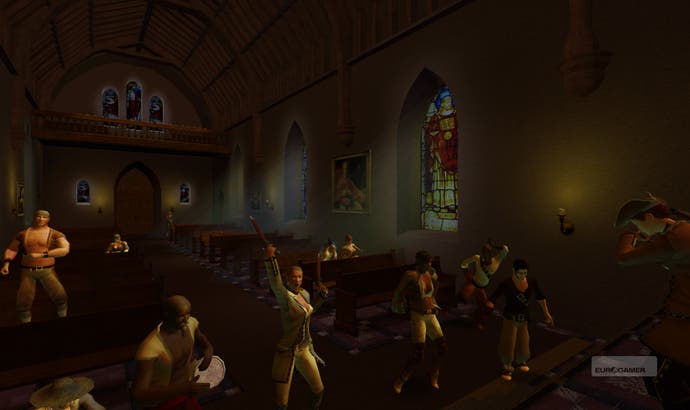Pirates of the Burning Sea
Pieces of... wait.
It's somewhat self-defeating picking away at discrete parts of Pirates of the Burning Sea, though, because more than any other MMO - other than Warhammer Online, perhaps - Pirates is steadfastly about the Big Picture. Unlike WAR's stern, single-minded utilitarianism, however, Pirates takes great pains to give you a sense of individuality whilst simultaneously steering you towards being a part of a larger operation. This is actually the game's strongest feature, and the reason you should possibly consider picking it up. Almost everything you do, from solo questing to PvP skirmishes to warehouse construction and resource excavation, has at least some small impact on what Pirates is really about: that is, the struggle between the game's four factions (British, French, Spanish, and Pirate).
It works like this: each port, other than a select few which remain permanently aligned with a particular side, can be conquered by a faction. This happens through a gradual process of contention - measured in Unrest points in the first stage, and then Conquest points in the second - which after reaching a certain point will precipitate into a scheduled port battle, to which the players who contributed to the uprising will be invited at random. One can assist in this process (or attempt to repress it) by defeating enemies in the port's vicinity, contributing unrest supplies, or by doing relevant quests.
For the casual MMO player, this is an exciting prospect, as it means nearly everything they do with their limited time in the game has a lasting impact (at least until a particular faction conquers the entire region, after which point the whole gameworld is reset and rewards are allotted). As an example, whilst I did my best to steer my weevil of a ship away from heavily contested ports - shown in red, signifying that PvP players have free rein in the area - I did my part by doing Unrest-reducing patrol quests outside Spanish ports. I had also hoped to contribute some sulphur as part of an Unrest supply bundle from a mine I'd built in a remote Spanish town, but it apparently wasn't needed. Which is fine, as I was able to sell it in the auction house to another player who would go on to use it to build ships which would then be bought by players like me to … Well, you get the idea.

Pirates' economy is a beautiful thing if you have the mind for it - which I don't, much to my parents' unending shame and consternation. The concept of every purchasable item in the game - other than certain bare necessities - being built, excavated, or captured by players is something seldom seen in modern MMOs, and it gives your decisions as an individual player a refreshing sense of pertinence.
Pirates' main draw for players is its focus on purpose and consequence, and that hasn't changed at all since I first played it. There have been some cosmetic upgrades - the Spanish and French capitals are now luxuriously modelled, for instance - and two epic group instances have been introduced, but Pirates' strengths and flaws remain the same. It's a deeply rewarding experience if you're willing to invest yourself in your chosen field, and it's also extremely enjoyable on a casual level, if only because of the nigh-on flawless ship combat. Having said this, the game's sorest spot remains its muddled Swashbuckling component, and that's going to require a major overhaul before Pirates can truly be called a complete experience. That may seem like an insurmountable task, but remember: EVE Online started life as a fairly formless space-mining simulator. All it took was a bit of enthusiasm.








